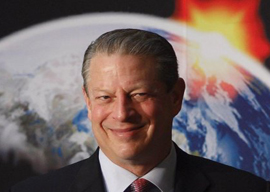
September 01, 2011

Al Gore
There isn’t any reasonable doubt about any of these things. All of those last three points are buttressed by masses of evidence that trained researchers painstakingly assembled over long periods.
Some of the scientists working in these fields are dishonest. In any group containing thousands of people there will be cranks, shysters, gold-diggers, opportunists, self-promoters, and nutcases. Most scientists are none of those things, just as most doctors, accountants, lawyers, architects, and priests are none of those things.
We thrill to let our minds dwell on bad actors: but the great majority of human beings, in science or any other sphere, are not bad actors. Practically all people, practically all the time, are trying to do the right thing. Practically all conspiracy theories are false. (You will likely get through life with your mind’s serenity undisturbed if you dismiss without investigation every conspiracy theory that comes to your attention. I do so reflexively.)
Nor will it do to say that persons who believe those last points are blindly submitting to authority. Certainly “settled science” is an authority. Most of it is built up from a mass of observations and experiments that no individual could hope to replicate, so the individual has at some point to surrender his judgment to faith—faith in scientific authority.
Science is a very particular kind of authority, though; a new kind in the world from the 17th century onward. Scientific authority is not like a drill sergeant, headmaster, or dictator’s authority. Nor is it like a religious (“It says so in the Holy Book!”) or doctrinal (“Aristotle said so!”) authority. It is a consensus authority, arrived at by discussion, comparing notes, argumentation, failed debunkings, endless checking and rechecking against observed phenomena, and the elimination of ideas that don’t match the evidence. Science is a social activity, open to anyone who does the training and observes the rules.
Science is in fact conservative, in a Burkean sense. It is an authority of tradition, reluctant to discard established understandings, willing to do so only if indisputable new evidence renders them untenable. Science is “catholic,” not “protestant.” The individual who, searching his private conscience, without reference to some hitherto-unconsidered body of data, finds he can no longer accept the validity of the Hertzsprung-Russell Diagram, has made his exit from science (or at least from astronomy).
In the case of nature v. nurture, key authority centers in our society are deeply hostile to the scientific findings as I have stated them. No politician, no New York Times editorialist nor even Op-Ed contributor, no senior religious figure, no academic in any of the humanities, professes to believe nature plays a role. The authority here is purely scientific, established by researchers in narrow subfields of psychology, sociology, and biology, and maintained in the teeth of hostility from political and cultural-authority centers.
So why the strong emotions? Well, keeping the same order of my three points:
1) If this is true, human beings are not a chosen species, as my religion assures me we are. My religion is very important to me; I can’t accept an idea that is so contrary to its teachings. No way!
2) I cannot be anything I want to be: my genome has me “on a leash” (E. O. Wilson). Worse yet: Big old mostly inbred populations, isolated for millennia in different environments, will diverge under natural selection and genetic laws, making race differences intractably real and group human equality unattainable. Yikes!
3) If that’s true, power freaks such as Al Gore will be able to bamboozle the public into granting them war-socialism powers. Over my dead body!
On the first two points I’m coolly unsympathetic, being irreligious and, from familial observations as well as science reading, inclined to genetic determinism. On the third, I’m more in tune with the emoters, having no desire to live under war socialism unless someone is obviously trying to steal my country.
There’s a nontrivial issue lurking in that third point, though. Global warming may be a bad thing. It may even, just possibly—I seriously doubt it, but it may be—as bad as Al Gore thinks it is.
There are conceivable natural disasters that would surely be as colossally awful as global warming is in Gore’s mind: An asteroid might be on a collision course with us, the Yellowstone Caldera might pop, another Carrington Event might bring down our infrastructure, or the plague might make a comeback.
We know that war socialism works for winning total wars. Been there, done that. Would it work on a global scale, against a global disaster, like the one of which Al Gore dreams? We should hope we never have to find out, but you can’t help wondering.